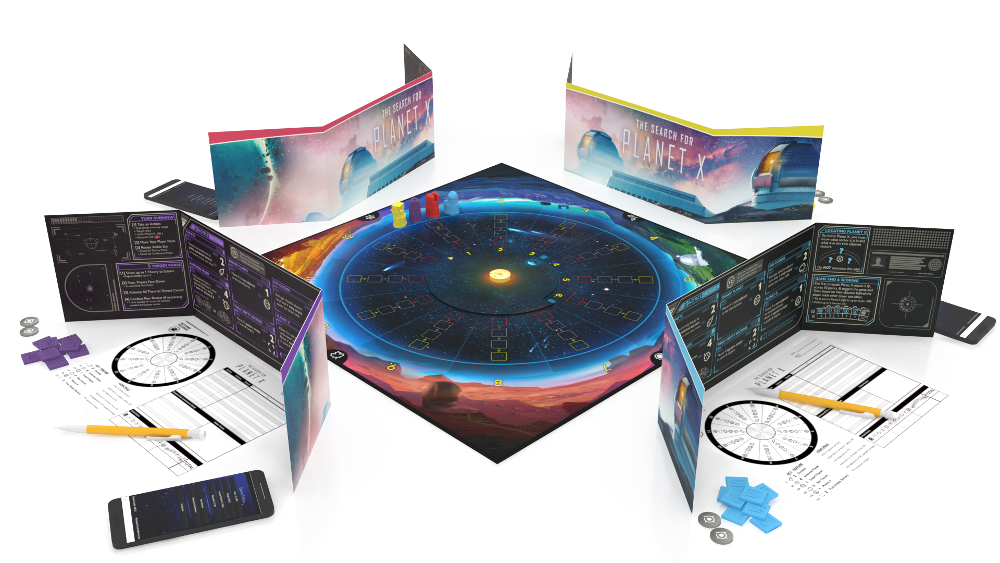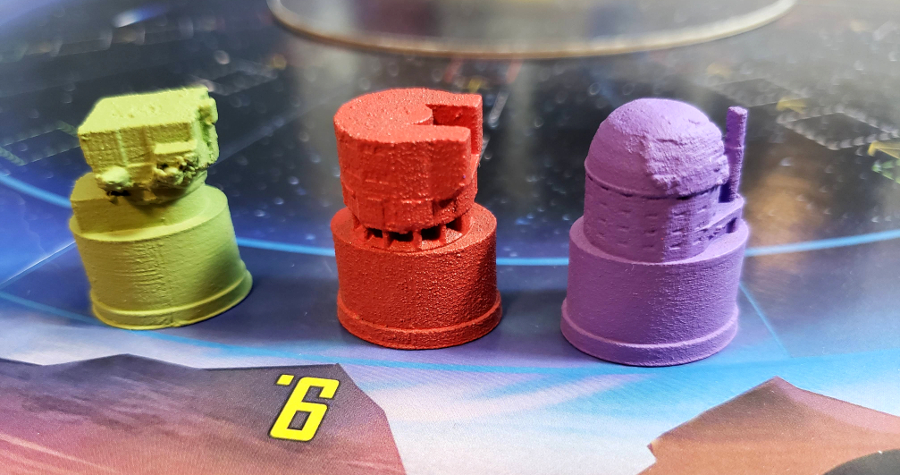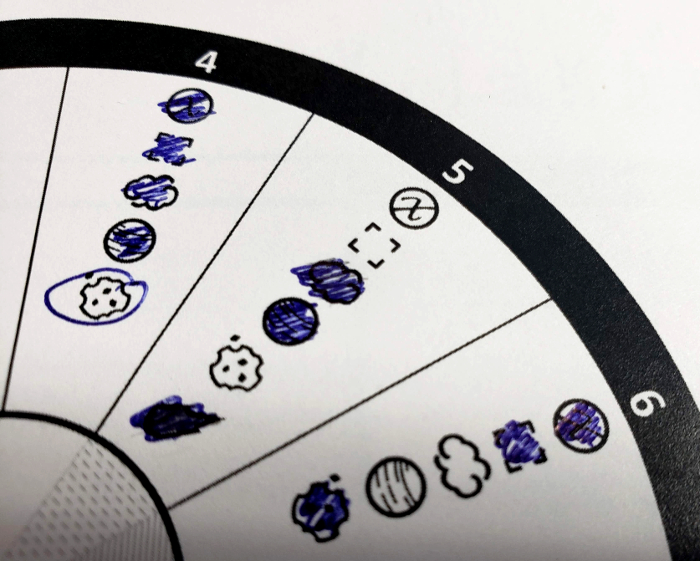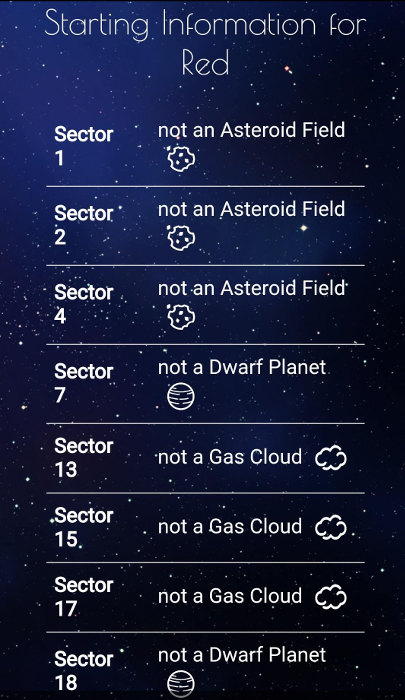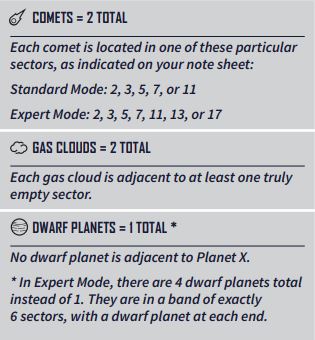As part of our June Spotlight on The Search for Planet X, we strive to inform readers of little extra tidbits surrounding the game. Games are made by people, and one of those tidbits we enjoy is learning a little bit more about the people behind them. Some designers shy away from the public stage, while others enjoy being front and center.
Despite having over a half dozen titles to their name already, The Search for Planet X was our first opportunity to sit down and get inside the heads of the design duo Matthew O’Malley and Ben Rosset. With familiar titles such as Between Two Cities and Homebrewers already out in the wild, these two have slowly built up a resume of light to middleweight titles that are highly approachable to newcomers while conveying novel themes and ideas in the process. It is these factors that drive them perhaps more than any other – stretching their creative efforts into flavorful concepts while still maintaining the ambiance of a game that anyone can sit down and play with ease. Which, as any designer will attest, is easier said than done.
Which is why when we first got word that their next title was to be a digital hybrid deduction game about discovering hidden objects in space, we were immediately intrigued as to how such a game was conceived and developed.
In the studious, academic-flavored Search for Planet X, each player is an astronomer looking to make their big break into the history books by deciphering the location of the mysterious Planet X hidden at the edges of our solar system. Throughout the course of the game, players take various actions from their observatory stations that help them hone in on where it lay undiscovered. In the game, the sky is divided up into different sectors, with each sector containing exactly one Object with special characteristics – or is entirely empty. Thanks to app-driven setup logic, every game layout is different and each player is secretly provided initial bits of data as to the board’s makeup to get the hunt going quickly. By performing both deep-space and shallow scanning, engaging in academic research, and compiling their gathered information to make educated deductions as to the contents of each sector, eventually someone will determine where Planet X is and collect their long-desired reward: a byline in a scientific paper.
Oh and probably some other stuff too. But it’s mostly about the paper.
Wanting more intel ourselves on how the game came about, we were luckily about to lure Ben & Matthew away from their telescopes for some answers to our celestial-sized questions and were able to chat briefly about a game that’s somehow both cutting edge and comfortably familiar at the same time.
Enjoy!
Round One Questions
CR: What was your Gateway Game?
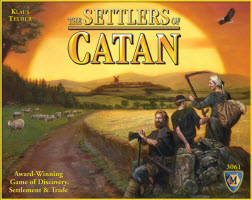 Ben: Settlers of Catan – I discovered it in 2007.
Ben: Settlers of Catan – I discovered it in 2007.
Matthew: I was a gamer all through school, from more traditional board and card games to Avalon Hill and Civilization. But my reintroduction to games in the early 2000s was through Acquire and Carcassonne.
CR: What was the last game you really enjoyed playing (besides your own titles)?
Ben: Although neither are new games, I’m finally playing through Pandemic Legacy Season 1 and really enjoying it so far – much more than I thought I would. I also really enjoyed Pulsar 2849 from CGE. I am a big CGE fan and will try just about anything they put out.
Matthew: For me, it was Keltis (with the expansion). It’s a fantastic game, and I’m disappointed it was never released in that form in the US.
CR: How big is your game collection?
Ben: I would say around 250ish games.
Matthew: About the same for me.
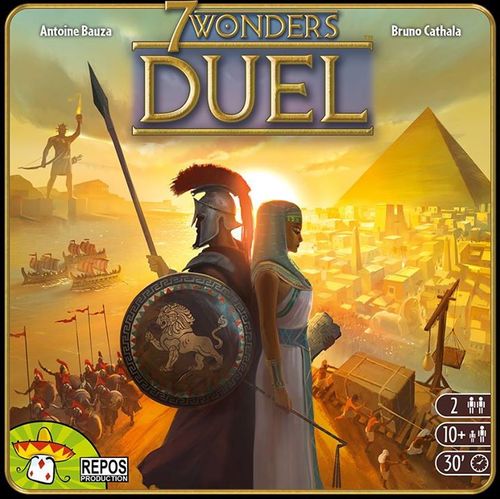
CR: What is your favorite type of game to play?
Matthew: I’m a huge fan of cooperative games and games that delve into more non-traditional themes like the natural world.
Ben: I’ll answer this from a mechanics standpoint. Hand management and drafting are probably my favorite mechanics, and they go so well together. I love games like 12 Days, Sushi Go, and 7 Wonders Duel, as well as other card games like Lost Cities and Morels.
CR: How do you feel about Monopoly?
Both: It’s clearly outdated in terms of modern game design principles. That said, it certainly can help to teach basics that gamers need to know such as set collection, negotiation, bidding, and resource (money) management. The problem is that too many people play it as a kid, and because of it decide that they don’t like board games, which is a shame. Current generations of gamers will use games like Catan to teach those principles to their children, though, so I think (hope) in the future Monopoly will no longer be the board game to represent what board games are like to children.
On The Search for Planet X
CR: First off, we’re curious where you stand on the Planet X theory (that there are one or more undiscovered planets in our solar system beyond Neptune). When did you first learn about it, and do you believe in the possibility personally?
Both: We definitely believe in the possibility. Whether or not it’s out there, something is causing strange behaviors of distant bodies in our solar system, and we hope to learn what that something is soon. It’s funny you mention Neptune too because that was actually the first planet in our solar system that was deduced instead of directly observed. Planet X could be the second!
CR: Some games clearly start with a theme and build mechanics around it, while others do the opposite. We have to confess that the two are so intertwined in The Search for Planet X that it’s hard for us to guess. Enlighten us! On which path did this game come to be?
Ben: All theme. In late 2016 we first read about the theory proposed that there might be a distant, giant planet hiding in the outer reaches of our solar system. We were immediately inspired to create a game about it. I had a strong feeling it should be a deduction game. It took about a year until the basic deduction system gelled, but once it did, we were able to move forward pretty quickly with the rest of the design and development.
CR: What are some of your favorite deduction games? Did any of them influence how you approached designing Planet X?
Ben: Alchemists is my favorite deduction game (and one of my favorite games of all time) and it was a big influence for Planet X. From the beginning, our goal with Planet X was to make an Alchemists style logic deduction game that gives you the same satisfaction of solving a puzzle but that plays in under an hour.
Matthew: I’ve enjoyed Sleuth and Scotland Yard for years, and Hanabi and Codenames more recently. But as Ben says, Alchemists was definitely the biggest influence on Planet X.
CR: The Search for Planet X isn’t the first game to introduce a hybrid digital / analog experience, but it seems to strike a balance between managing the bulk of the game’s setup and logic puzzle while still leaving most of the agency with the players. Was it hard to find the correct balance in that, and how did you know when you finally had it where you wanted it?
Both: From the start we knew that we wanted the app to do basically two things – randomize setup and give private answers to public questions. We never really wanted the app to do anything more than that. It did grow into doing a bit more, but we always wanted to keep the focus on the board game experience, not the app. We want to give Foxtrot a shout out here for the amazing development work they did on the game. Randy Hoyt and his team made sure the app plays a supportive role while leaving the players’ decisions focused squarely in the physical realm.
CR: On the same note, this is your first delve into a hybrid game. What sort of design challenges did you run into that you hadn’t experienced in your other games?
Ben: Nothing in particular, other than creating the app itself. Matthew is an IT developer and he developed version 1 of the app that we were able to use during playtesting and development before we even pitched the game to publishers. I was so impressed how quickly he built the app.
CR: We know the game will primarily be seen as a deduction game, but it’s also pretty rare for a game to incorporate aspects of scientific and academic study. (The game includes a “peer review” mechanic which amuses us to no end.) How did those thematic elements evolve over its development?
Both: We have to give Randy and his team all the credit for that. They added the peer review mechanic as well as the time track mechanic to the game during development and the game is clearly better, mechanically as well as thematically, for both of those additions. Their approach and dedication to the development of the game really impressed us.
CR: The game has a number of different objects (Asteroid Field, Comet, Gas Cloud, etc.) that each have their own logic rules. Were there any objects you tried that didn’t make it into the final game? Or any that ended up being wildly different than the final version?
Both: Actually, no! The set of objects that are in the expert mode now (Dwarf Planets, Gas Clouds, Comets, Asteroids, and Planet X) are the same ones, in the same quantities, and with the same logic rules that we had right from the first playtest!
CR: Finally, let’s say by a stroke of luck, Planet X is actually found and you have the sole privilege of naming it. What would you call it?
Both: We would name it after the researchers that first proposed the Planet X hypothesis in the first place: Konstantin Batygin and Mike Brown. So, maybe, Brotygin?
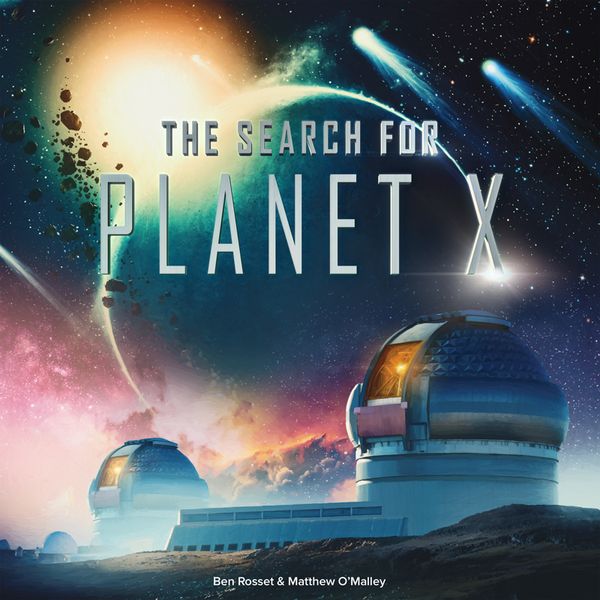
Photo Credits: The Search for Planet X cover and photos by Foxtrot Games and Renegade Game Studios.

